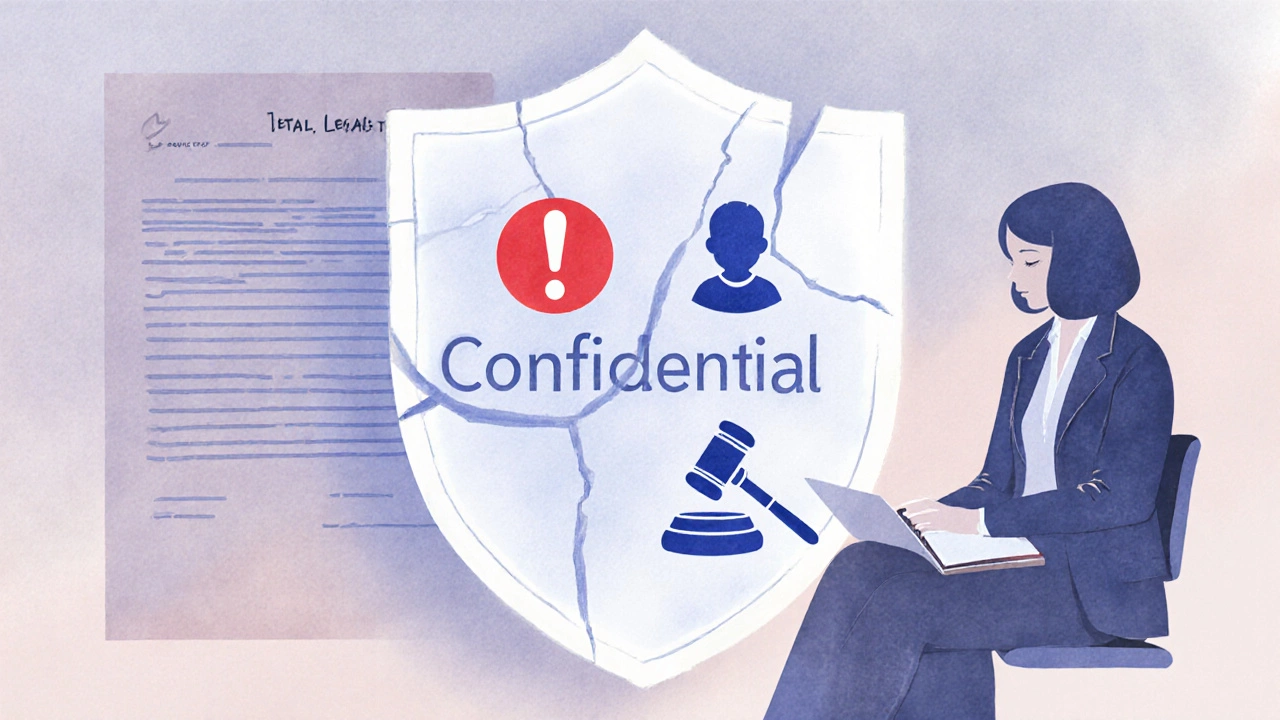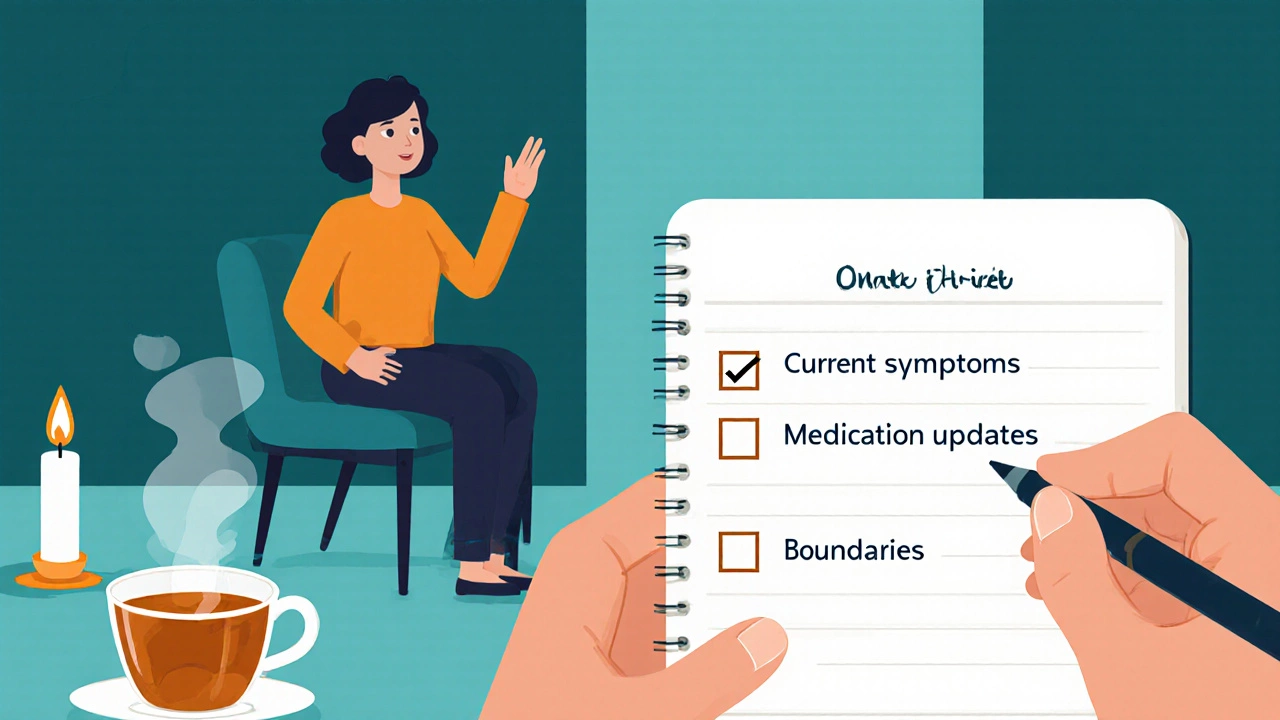Therapy Disclosure Guide
Select the category that best describes the information you're considering sharing:
How comfortable are you discussing this information with your therapist?
Your Recommendation
Quick Takeaways
- Therapists keep most info private, but there are legal limits.
- Share enough to let them understand patterns, but you control the pace.
- Know the difference between confidential details and mandatory‑reporting triggers.
- Use clear language, ask questions, and set boundaries early.
- Regular check‑ins about what you’re comfortable sharing keep the relationship healthy.
Understanding Confidentiality
When you walk into a session, you expect a safe space. Therapist is a licensed mental‑health professional who provides counseling, psychotherapy, or other therapeutic services is ethically bound to protect what you say. This promise is called confidentiality. It means the therapist cannot share your personal details with anyone without your explicit permission.
Legal Limits & Exceptions
Confidentiality isn’t absolute. Most jurisdictions recognise privileged communication, a legal concept that protects client‑therapist conversations from court‑ordered disclosure. However, there are three common exceptions that override privilege:
- Risk of harm: If you or someone else is in imminent danger, the therapist must report it.
- Child or elder abuse: Suspected abuse of a vulnerable person must be reported to authorities.
- Court orders: In rare cases a judge can compel disclosure, usually after a thorough review.
These rules are often outlined in the informed consent form you sign at the start of therapy. That document spells out exactly what is private and what may be disclosed.

How Much Should You Share?
The goal of therapy is to help you identify patterns, develop coping skills, and work toward change. To do that, the therapist needs a clear picture of the relevant facts. Here’s a practical framework:
| Category | Essential to Share | Helpful but Optional | Usually Not Needed |
|---|---|---|---|
| Current symptoms | Frequency, intensity, triggers | How you cope daily | Exact timeline of every past episode |
| Medical history | Diagnosed mental‑health conditions, medication list | Previous therapy experiences | All past physical illnesses unless linked to mood |
| Relationships | Key conflicts affecting you | Family background details | Every anecdote about distant relatives |
| Legal issues | Any ongoing court matters that affect your mental state | Past minor infractions | Charges that were dismissed years ago |
Notice the pattern: share anything that directly influences your current well‑being, hold back details that don’t add value right now.
Why Full Disclosure Often Helps
When you’re open about the core issues, the therapist can:
- Identify underlying beliefs that drive behavior.
- Match therapeutic techniques (e.g., CBT, DBT) to your specific challenges.
- Track progress accurately, adjusting the treatment plan as needed.
Skipping crucial facts can lead to misdiagnosis, ineffective interventions, or a feeling that the therapist “just doesn’t get you.”
When It’s Okay to Hold Back
Therapy is a partnership, not an interrogation. You have the right to pause on topics that feel too raw, especially early on. Consider these scenarios:
- Trauma flashbacks: If recounting an event triggers overwhelming distress, tell the therapist you need a break.
- Privacy concerns: You might be unsure about sharing a partner’s personal details until trust builds.
- Legal strategy: If you’re involved in a lawsuit, you may want to consult a lawyer before disclosing certain facts.
In each case, articulate your hesitation. “I’m not ready to talk about X yet, can we revisit it later?” keeps the dialogue honest.

Tips for Communicating Comfortably
- Set expectations early: Ask the therapist how they handle confidentiality and what they need from you to start.
- Use a checklist: Write down the main topics you want to cover before each session. That reduces anxiety about forgetting something important.
- Ask ‘why’: If a therapist asks about a detail that feels invasive, say, “Can you explain why that’s relevant?” This clarifies purpose.
- Check‑in regularly: Every few sessions, ask, “Do we have enough info to move forward?” and adjust accordingly.
- Practice self‑compassion: Remember that therapy is a learning curve. It’s okay to make mistakes in disclosure; the therapist is there to support you, not judge.
Common Pitfalls & How to Avoid Them
Even well‑meaning clients stumble. Here are three frequent errors and quick fixes:
- Oversharing unrelated drama: It can drown out the core issue. Keep the focus narrow; you can explore side stories later.
- Withholding everything out of fear: Leads to vague sessions and stalled progress. Start with small, concrete facts.
- Assuming the therapist knows everything: They can’t read your mind. Explicitly state what you think they might be missing.
Frequently Asked Questions
Is anything I say ever truly private?
In most places, conversations with a licensed therapist are protected by privileged communication, meaning they cannot be disclosed without your consent, except for the legal exceptions mentioned earlier.
What should I do if I’m afraid my therapist might judge me?
Bring that fear into the session. A good therapist will explore the feeling, reassure you about the therapeutic stance, and help you understand why the judgment fear exists.
Can I stop sharing if a topic feels too painful?
Absolutely. You have the right to pause. Say something like, “I’m not ready to discuss that yet,” and the therapist will respect the boundary and work with you on pacing.
Do I need to tell my therapist about medication changes?
Yes. Medications, even over‑the‑counter ones, can affect mood and cognition, which are central to therapy outcomes. Keep the therapist updated.
What if I’m in a legal case and worry about self‑incrimination?
Talk to your therapist about the legal context. They can help you separate therapeutic disclosure from legal testimony and may suggest limiting certain details until you’ve consulted counsel.
Ultimately, the decision of what to reveal rests with you. The therapist’s role is to provide a non‑judgmental space, guide you toward insight, and respect the boundaries you set. By understanding confidentiality, legal limits, and the practical benefits of honest communication, you can make a clear, confident choice about how much to share.
